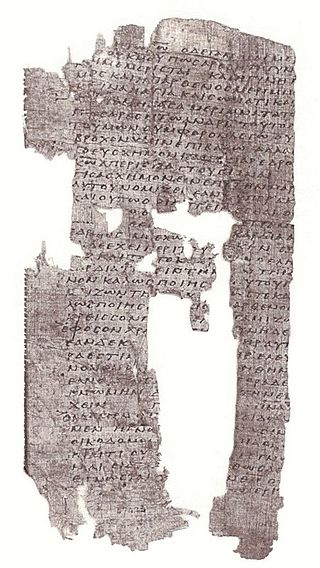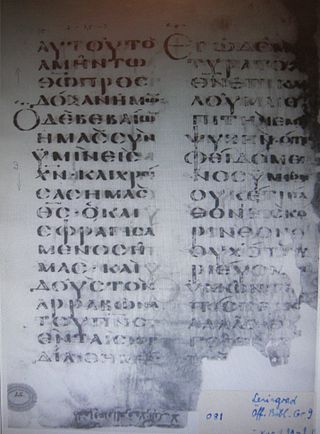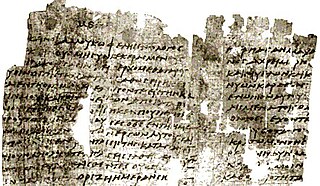
James 1 is the first chapter of the Epistle of James in the New Testament of the Christian Bible. The author identifies himself as "James, a servant of God and of the Lord Jesus Christ" and the epistle is traditionally attributed to James the brother of Jesus, written in Jerusalem between AD 48 and 61. Alternatively, some scholars argue that it is a pseudographical work written after AD 61.

2 Corinthians 5 is the fifth chapter of the Second Epistle to the Corinthians in the New Testament of the Christian Bible. It is authored by Paul the Apostle and Timothy in Macedonia in 55–56 CE.

1 Corinthians 4 is the fourth chapter of the First Epistle to the Corinthians in the New Testament of the Christian Bible. It is authored by Paul the Apostle and Sosthenes in Ephesus, composed between 52–55 CE. Paul continues to confront the factionalism of the Corinthian church and describes the role of an apostle.

1 Corinthians 7 is the seventh chapter of the First Epistle to the Corinthians in the New Testament of the Christian Bible. It is authored by Paul the Apostle, a citizen of Tarsus and Sosthenes in Ephesus. In this chapter, Paul replies to certain questions raised by the Corinthian church in a letter sent to him.

2 Corinthians 1 is the first chapter of the Second Epistle to the Corinthians in the New Testament of the Christian Bible. It is authored by Paul the Apostle and Timothy in Macedonia in 55–56 CE.

2 Corinthians 2 is the second chapter of the Second Epistle to the Corinthians in the New Testament of the Christian Bible. It is authored by Paul the Apostle and Timothy in Macedonia in 55–56 CE.

2 Corinthians 3 is the third chapter of the Second Epistle to the Corinthians in the New Testament of the Christian Bible. It is authored by Paul the Apostle and Timothy in Macedonia in 55–56 BC. Biblical commentator Heinrich Meyer emphasises that the use of the plural 'we' in 2 Corinthians 3:2 and 2 Corinthians 3:6 includes Timothy in the writing of the letter.

2 Corinthians 7 is the seventh chapter of the Second Epistle to the Corinthians in the New Testament of the Christian Bible. It is authored by Paul the Apostle and Timothy in Macedonia in 55–56 CE.

2 Corinthians 10 is the tenth chapter of the Second Epistle to the Corinthians in the New Testament of the Christian Bible. It is authored by Paul the Apostle and Timothy in Macedonia in 55–56 CE. According to theologian Heinrich August Wilhelm Meyer, chapters 10–13 "contain the third chief section of the Epistle, the apostle's polemic vindication of his apostolic dignity and efficiency, and then the conclusion".

Galatians 1 is the first chapter of the Epistle to the Galatians in the New Testament of the Christian Bible. It is authored by Paul the Apostle for the churches in Galatia, written between 49 and 58 AD. This chapter contains Paul's significant exposition concerning the significance of God's revelation of Jesus Christ.

Galatians 6 is the sixth chapter of the Epistle to the Galatians in the New Testament of the Christian Bible. It is authored by Paul the Apostle for the churches in Galatia, written between 49–58 CE. This chapter contains Paul's exhortations and also a summary of the key points in the epistle.

1 Thessalonians 1 is the first chapter of the First Epistle to the Thessalonians in the New Testament of the Christian Bible. It is authored by Paul the Apostle, likely written in Corinth in about 50–51 AD for the church in Thessalonica. This chapter contains the prescript and Paul's thanksgiving for the church.

James 2 is the second chapter of the Epistle of James in the New Testament of the Christian Bible. The author identifies himself as "James, a servant of God and of the Lord Jesus Christ" and the epistle is traditionally attributed to James the brother of Jesus, written in Jerusalem between 48 and 61 CE. Alternatively, some scholars argue that it is a pseudographical work written after 61 CE. This chapter contains an exposition about the commandment, "You shall love your neighbour as yourself", and about dead faith.

James 3 is the third chapter of the Epistle of James in the New Testament of the Christian Bible. The author identifies himself as "James, a servant of God and of the Lord Jesus Christ" and the epistle is traditionally attributed to James the brother of Jesus, written in Jerusalem between 48 and 61 CE. Alternatively, some scholars argue that it is a pseudographical work written after 61 CE. This chapter contains an exposition about wisdom and humility.

James 5 is the fifth chapter of the Epistle of James in the New Testament of the Christian Bible. The author identifies himself as "James, a servant of God and of the Lord Jesus Christ" and the epistle is traditionally attributed to James the brother of Jesus, written in Jerusalem between 48 and 61 CE. Alternatively, some scholars argue that it is a pseudographical work written after 61 CE. This chapter contains a warning to the rich and an exhortation to be patient until the coming of the Lord.

1 Peter 4 is the fourth chapter of the First Epistle of Peter in the New Testament of the Christian Bible. The author identifies himself as "Peter, an apostle of Jesus Christ" and the epistle is traditionally attributed to Peter the Apostle, but some writers argue that it is the work of Peter's followers in Rome between 70 and 100 CE. This chapter focusses on Christ's suffering, Christian charity and advice to those who are persecuted.

2 Peter 2 is the second chapter of the Second Epistle of Peter in the New Testament of the Christian Bible. The author identifies himself as "Simon Peter, a bondservant and apostle of Jesus Christ" and the epistle is traditionally attributed to Peter the Apostle, but some writers argue that it is the work of Peter's followers in Rome between the years 70 and 100.

Hebrews 12 is the twelfth chapter of the Epistle to the Hebrews in the New Testament of the Christian Bible. The author is anonymous, although the internal reference to "our brother Timothy" causes a traditional attribution to Paul, but this attribution has been disputed since the second century and there is no decisive evidence for the authorship. This chapter contains the call to respond gratefully and nobly to God's invitation.

Revelation 8 is the eighth chapter of the Book of Revelation or the Apocalypse of John in the New Testament of the Christian Bible. The book is traditionally attributed to John the Apostle, but the precise identity of the author remains a point of academic debate.

Revelation 15 is the fifteenth chapter of the Book of Revelation or the Apocalypse of John in the New Testament of the Christian Bible. The book is traditionally attributed to John the Apostle, but the precise identity of the author remains a point of academic debate. This chapter includes the hymn of Moses and the Lamb and introduces the seven angels who appear with seven plagues.














